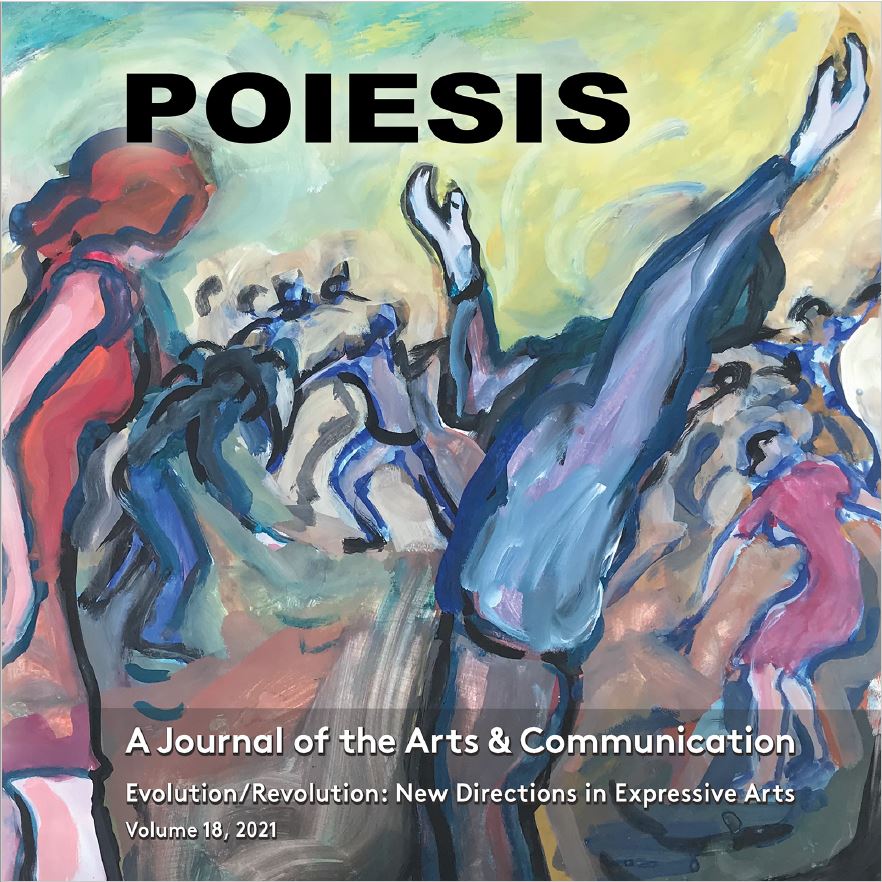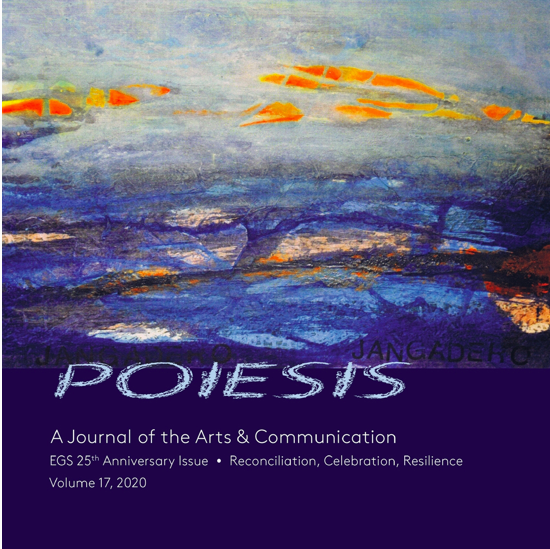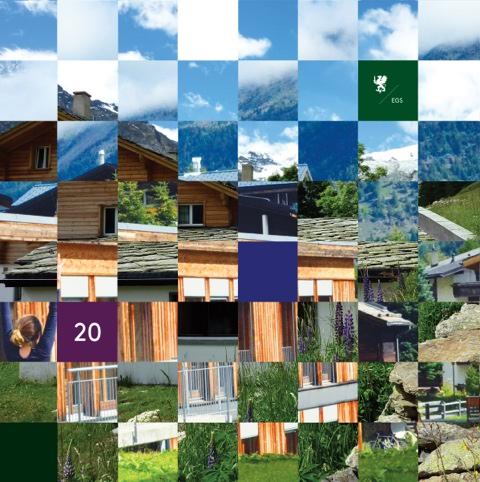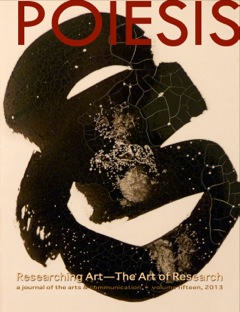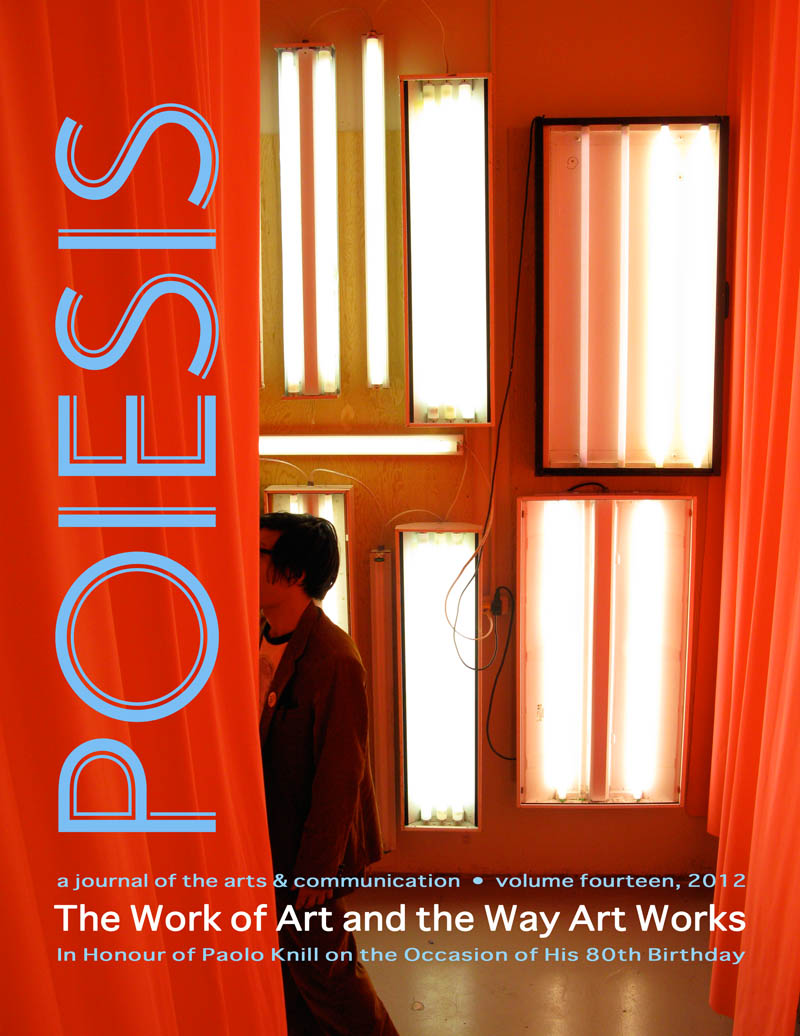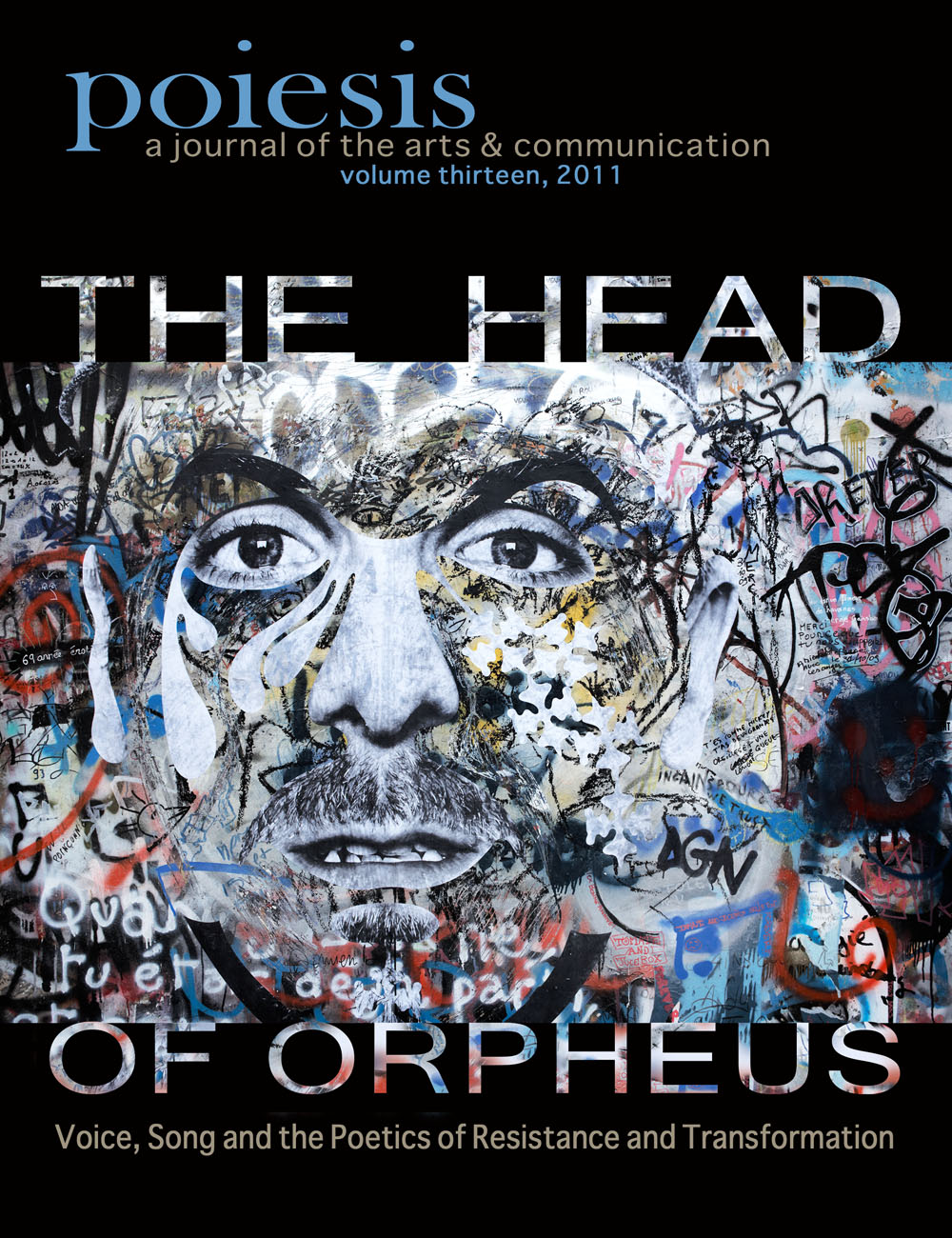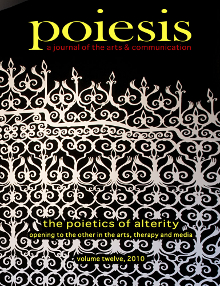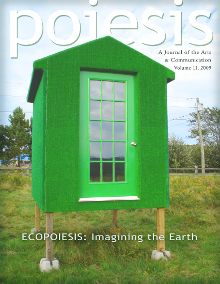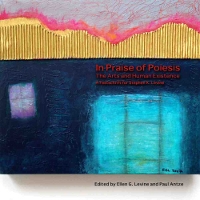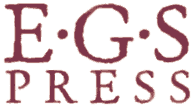
Welcome
Who We Are
EGS Press is an independent publishing company located in Toronto, Canada. We have been in operation since 1998, when it became clear that the European Graduate School in Switzerland would benefit from a forum in which to publish material emerging from its work in the fields of media, the arts and therapy. EGS offers masters and doctoral degrees in Media and Communications, and in Expressive Arts: Therapy, Education, and Consulting. EGS Press aims to publish works of substantial quality in these and associated areas. In addition to books, EGS Press publishes a yearly journal, POIESIS: A Journal of the Arts and Communication, containing essays, poetry and works of visual art.
POIESIS XXI, 2024
A Journal of the Arts & Communication: Next Steps, New Beginnings
In this issue of the POIESIS journal, Gaza is never far from mind. The poems remembering Rachel Corrie in the journal were inspired by the acts of a young woman who was herself dedicated to breaking the cycle of violence. She went to Gaza to testify that another way is possible. We know that she was broken, broken by the Israeli bulldozer which buried her in Gaza. Can the poems become a memorial to her, one which interrupts us in our lives and helps us begin again in a new way? Remembering would then be a true beginning.
A PDF is available for download at https://www.egspress.com/Poiesis2024/POIESIS_Vol_21_2024.pdf (143 MB). This will open in a new tab.
ISBN 978-1-7776817-3-9
POIESIS XX, 2023
A Journal of the Arts & Communication: In the Midst of Crisis - What is Emerging?
In this issue of the POIESIS Journal, contributors respond to the question the theme poses, "In the Midst of Crisis - What is Emerging." The answer is: poiesis in all its forms- reflective essays, poetry and artworks. Margo Fuchs Knill sets the stage by her poetic and thoughtful response to the crisis of climate change, finding hope in dark places. Essays and art-works follow by exploring the possibility of playing in the ruins and emerging with new forms. For this 20th issue of the journal, we look back at material published in the past on the theme of, "The Image Today." Even past images of destruction can be imaginatively transformed in ways that take us forward into the future. Jacques Stitelmann provides an expanded account of modalities of the imagination, and Paolo Knill invites us to decenter from past trauma and imagine future solutions. Even in the midst of crisis, the imaginative responses of contributors to this issue show us that poiesis is always possible.
A PDF is available for download at https://www.egspress.com/Poiesis2023/POIESIS_Vol_20_2023.pdf (15MB). This will open in a new tab.
The Journal is also available for purchase on Amazon.com at Amazon.com This will open in a new tab.
ISBN 978-1-7776817-2-2
POIESIS XIX, 2022
A Journal of the Arts & Communication: Encountering the Other
As I am writing, the war in Ukraine rages on. We don’t know what will happen next, whether there will be some sort of cease-fire (I won’t say “peace“) or an escalation with even more horrendous results. Whatever happens, I am still left with the question that the theme of this journal poses: What does it mean to encounter the other? In Ukraine, it means murder, violence without limit. Nor of course is this an isolated incident. Human history is marked by war and genocide. It sometimes seems as if our primary mode of encountering others is to kill them.
A PDF is available for download for the near future at https://www.egspress.com/Poiesis2022/POIESIS_2022_FINAL.pdf (67MB). This will open in a new tab.
A video promoting the new journal is available at https://vimeo.com/707928915. This will open in a new tab.
The Journal is also available for purchase on Amazon.com at Amazon.com This will open in a new tab.
ISBN 978-17776817-1-5
POIESIS XVIII, 2021
A Journal of the Arts & Communication: Evolution:Revolution: New Directions in Expressive Arts
This issue of the POIESIS journal is dedicated to Paolo Knill, a pioneer in the field of expressive arts therapy at Lesley University in Cambridge, MA. and founder and first Provost of the European Graduate School in Switzerland. In September 2020, in the middle of the pandemic, Paolo Knill passed away. He was our inspiration, the minstrel of soul whose music resounds in our ears. We will mourn him as long as we live.
The theme of the issue is "Evolution/Revolution: New Directions in Expressive Arts." In addition to articles, poetry and images reflecting on the legacy of Paolo Knill, the journal also explores where we are now in the expressive arts field. Contributors from all over the world ask, "Where do we need to go from here?" Shall we continue to evolve and build upon what we have or go in a totally new direction and step forward onto a different path in the future? We invite readers to engage with this question and take steps forward into their own way of thinking, doing and making.
Click here to order a copy from Amazon. This will open in a new tab
ISBN 978-1777681708
POIESIS XVII, 2020
EUROPEAN GRADUATE SCHOOL 25TH ANNIVERSARY - A Journal of the Arts & Communication:
I am proud to introduce a new issue of the POIESIS journal during this critical period of human existence. As populations all over the world are threatened, we have to ask ourselves: What is worth saving? What is worth our dedication? The threat of futility hangs over us all. We have our daily lives and our routines, we strive to keep a semblance of normality during this abnormal time, but despair, the absence of hope, is always present.
When we began to plan for the publication of this issue of the journal, we envisioned it as celebration of the 25th anniversary of The European Graduate School (EGS). The theme that we proposed was, "Reconciliation, Celebration, Resilience." Now we have to ask ourselves:What does this reconciliation imply? The word itself means, "to bring back together again." Certainly we do not want to reconcile ourselves to the fate of mass extinction. We strive mightily to overcome this, and the efforts made to do so are carried out by people working together. There is already reconciliation in the recognition of our interconnection.
Click here to order a copy from Amazon. This will open in a new tab.
ISBN 978-0-9685330-8-6
POIESIS XVI, 2015
EUROPEAN GRADUATE SCHOOL 20TH ANNIVERSARY - AESTHETIC AND CRITICAL EDUCATION:
A special Publication in Honour of 20 Years of Teaching at The European Graduate School – With Essays and Testimonials by EGS Faculty from the Division of Arts, Health & Society and the Division of Philosophy, Art & Critical Thought. What does it mean to teach and to learn? How can education be an aesthetic experience? What is distinctive about the style of learning at The European Graduate School? These essays by noted thinkers and practitioners reflect upon their experience at what has been called “The White Mountain College.”
Articles: Christopher Fynsk, “Teaching Events: The Division of Philosophy, Art, and Critical Thought,” Philippe Beck, “The Educator Educated,” Stephen K. Levine, “Aesthetic Education: The Division of Arts, Health & Society,” Sally Atkins, “Aesthetic Education at the European Graduate School: Holding the Heartbeat,” Michael Schmidt, “The Event of Thinking: The European Graduate School is both University and Symposium,” Jeremy Fernando, “Or les lecons de la maitresse,” Ellen G. Levine, “Degradation and Preservation,” Margo Fuchs-Knill and Paolo Knill, “Aesthetic Responsibility in Expressive Arts: Thoughts on Beauty, Responsibility and the New in the Education of Expressive Arts Professionals, “ Margo Fuchs-Knill, “Three Poems,” Barbara Hielscher-Witte, “Thinking Art-The Art of Thinking: A Turnaround,” Herbert Eberhart, “Education for Life: Our Way of Teaching at EGS,” Paul Antze, “The Saas-Fee Experience,” Victor Vitanza, “Teaching and Studying in EGS: An Experience High in the Alps, both Transalpine and Subalpine,” Geert Link, “Teaching Critical Internet Culture,” Heather Dawson, “Making Meaning: Experiencing Aesthetics in Education,” Ellen. G. Levine, “Art Asylum: Exploring Otherness Through Play and Art-making,” Brigitte Wanzenreid, “Short and Intense: A One Night Exhibition at EGS, June 2014,” Peter Wanzenreid, “The Art of Teaching,” Rowesa Gordon, “Pictographs: Painted Drawings: My Experience as Artist-in-Residence,” Shaun McNiff, “Using and Perfecting the Universal Languages of Art,” Judith Greer Essex and Wes Chester, “Embodying Scholarship, “ Aylin Vartanyan Dilaver, “Beauty & Truth,” Markus G.Scott-Alexander, “The Pause,” Melinda Meyer, “What Makes the Difference in Being a Teacher at EGS?”, Simon Critchley and Manuela Kolke, “Does Critique Still Hold in Paradise?: A Conversation Between Simon Critchley & Manuela Kolke,” Carrie MacLeod, “Composing a Home Away from Home,” Alessandro De Franceso, “A Place of Joy and Possibility,” Christopher Fynsk, “An Open Site,” Sally Atkins, “After.”
Click here to order a copy from Amazon. This will open in a new tab.
ISBN 978-0-9685330-7-9
POIESIS XV, 2013
RESEARCHING ART - THE ART OF RESEARCH:
It is said that poiesis is a way of knowing. What do we really mean by that? Is the kind of knowing that happens in the arts different than the kind that happens in scientific inquiry? Are we expecting too much of the arts when we ask them not only to move us but also to teach us something new? And what about the proper way to know art itself? Should we use art to know art – or do we need to step outside of poiesis and go to theoria to understand art as it should be understood?
These and other questions are especially relevant when, on the one hand, there is a greater and greater demand for “evidence-based research” (even when it’s not clear what “evidence” means) and, on the other hand, “art-based research” becomes the slogan for a variety of approaches to research that employ the arts in one way or another. We live in a time when boundaries are crossed and sometimes crossed out – do we lose something when we plant ourselves firmly in the territory of both art and science? Is poiesis enough? Or do we need to supplement poietic knowing with “theory”?
This issue of the POIESIS journal features contributions using art as research, thinking about art as research, and thinking and showing how art itself is to be known. Articles, poems and images from both the fields of the expressive arts and of media and communication all deepen our understanding of the art of research.
Authors: Stephen K. Levine, "Poiesis and the Understanding of Art: A Conversation with Jean-Luc Nancy," "What are Philosophers for? An Interview with Judith Butler," Wolfgang Schirmacher, "On the World View of a Vita Activa," Christopher Fynsk, "At the Stove with Ferran Adrià," Shaun McNiff, "The Open Space of Art-Based Research," Sabine Silberberg, "Knowing Not- Knowing: Rethinking Research as an Art- Analogue Process," Koenig, Schild & Hufschmid, "Seeing Art as RAW DATA: Artistic Transformation," Kelly Clark/Keefe, Jessica Gilway, and Emily Miller, "Maps, Flesh & the Radicant: Mobilizing the Expressive Arts and Arts-Based Research to do a Conceptual Translation of "Science-as-Usual," Vachel Miller, Katrina Plato, Kelly Clark/Keefe, John Henson, and Sally Atkins, "Love Letters, Notes and Post Cards: About Pedagogy, Ways of Knowing, and Art-Based Research," Ellen G. Levine and Stephen Levine, "The Beauty That Sustains: An Arts-Based Research Exploration of Expressive Arts Therapy with Children," Lisa Herman, "Playing with Auschwitz: A Liminal Inquiry into Images of Evil," Carrie MacLeod, "Per-formingHome: Spinning New Scripts for Re-Search," Jena Leake, "Living Nel Mezzo: Becoming an Artist/Researcher/Teacher/Therapist in the Expressive Arts," Kathleen Vaughan, "Map as Theory,Theory as Map: Meditations from the Middle of the Journey," Patrick Phillips, "Performance as Research-A Double Fold."
Poets: Daniela Elza, Stephen K. Levine, Dorota Kozusznik-Solarska, Stella Audonoff, James P. Lenfestey, Marc J. Straus, Thomas R. Smith, Wes Chester, Judith Greer Essex, Norman Minnick, Emily Fiddy, Carrie MacLeod, Elizabeth Gordon McKim, Jean Luc Nancy.
Artists: Mowry Baden, Paulette Phillips, Chris Cran, Don Gill, Mowry Baden, Wolfgang Laib, Marin Majic, John Newsom, Lucy Pullen, Matthew Thomson, Chris Cran, Rowesa Gordon, Andrew Harwood.
Click here to order a hard copy from Caversham Booksellers, our preferred bookseller.
$29.99 Cdn / $29.99 US
ISSN 1492-4986/2013
POIESIS XIV, 2012
THE WORK OF ART AND THE WAY ART WORKS:
In Honour of Paolo Knill on the Occasion of His 80th Birthday
Paolo Knill, the founder of the European Graduate School, is a pioneer in developing ways for the arts to work in the lives of contemporary individuals and communities. He has taken the psychological framework in which art is understood within the arts therapies and turned it towards a recognition of the centrality of the work, not the subjectivity of its maker. His concept of “decentering” emphasizes both the radical separation of the alternative world of the imagination from the concerns of the everyday and, through subsequent “aesthetic analysis,” the importance of works of art for our experience of life. Art is not self-expression, but it has an undeniable effect on the person or community which receives it. Achieving this “effective reality” is the responsibility of all those who work with the arts to help bring about change; it is our “aesthetic responsibility.”
In this special issue, we invite members of the EGS community and others to reflect on the work of Paolo Knill as well as on the place the arts may have within our experience. Can the work of art still play the central role which it did in traditional cultures or has what Walter Benjamin called the elimination of the “aura” of the work in the “age of mechanical reproduction” rendered it impossible for art to give meaning and value to life? Does the “age of digital reproduction” in which we now live intensify this process or open up new possibilities for artistic creation? In what ways can we reinvent the arts so that they have a connection with our lives? Heidegger once wrote, Das Werk wirkt (The work works). How can the work work for us today?
Click here to view the Audio and Video Gallery
Click here to order a hard copy from Caversham Booksellers, our preferred bookseller.
$37.50 Cdn / $37.50 US
ISSN 1492-4986/2012
POIESIS XIII, 2011
THE HEAD OF ORPHEUS:
Voice, Song and the Poetics of Resistance and Transformation
Are voice and song primary modes of communication? How is it that voice-work can affect us in such a powerful way? In this issue of the journal, we explore the primacy of the voice in poetry and song, seeking to understand its communicative and transformative power. Our authors explore the resurgence of the oral tradition, the origins of the poetic, the extreme reaches of vocal expression and the ways in which digital media both close off and open up new possibilities for primary vocalization. More than an academic exploration of voice, the issue speaks to us as we read it, and sometimes it even seems to sing.
And for the first time, the journal has links to audio and video presentations connected to the theme - we can look and listen as well as read.
Articles: Rishma Dunlop, "Vox Humana," Elizabeth Gordon McKim, "Ride the Poetry Bus: An Excursion Into the Oral Tradition of Song/Story/and Poem," Fides Krucker, "Chiaroscuro: The Bodhisattva in the Voice," Vivian Darroch-Lozowski, "Making Worlds: the Extended Voice Work of Richard Armstrong," Richard Armstrong, "The Irritant," Linda Wise, "Voice and Soul: The Alfred Wolfsohn/Roy Hart Legacy," Enrique Pardo, "Figuring out the Voice: Object, Subject, Project," Allucquére Rosanne Stone, "Song and Resistance," Christina Foisy, "Gloomy Sunday on a Tuesday: The Unsound Voices of Suicide re-membered Through Sound Poetics," Peter Price, "Digital Sound and the Post-Human Future"
Poetry: Norman Minnick, Rebecca Chamberlain, Shara Claire, Jeffrey Thomson, Domenico Capilongo, Alison Luterman, Stephen K. Levine, Tomas O'Leary, Vivian Darroch-Lozowski, Maxine Yalovitz-Blankenship, Kristin Briggs, Andrew Sofer, Ewan Whyte, Lamont B. Steptoe, Phil Woods, Barry Dempster, Mihku Paul, James P. Lanfestey, Frank Miller
Art Work: Jenn E. Norton, Yi Xin Tong, Nicholas Hooper, Martha Townsend, Erin Gee, Rory Dean, Faye Mullen, Michael Caines, Nicola Woods, Jennifer Chan, Audio Lodge
Featured Artist: Elise Kermani
Click here to view the Audio and Video Gallery
Click here to order a hard copy from Caversham Booksellers, our preferred bookseller.
$29.95 Cdn / $29.95 US
ISSN 1492-4986/2011
POIESIS XII, 2010
THE POIETICS OF ALTERITY
How can we represent the Other? How can the Other represent us? In this issue of the journal, we are looking at ways in which we may open to the Other in the arts, media and the arts therapies. Is art a vehicle for the expression of the self or does it necessarily imply transcendence toward otherness? What, if anything, is a self and how does it reach out to the Other, both the other person and the otherness of itself? Can poiesis be a basis for ethical practice or is there, as Kierkegaard thought, an insuperable gap between the aesthetic and the ethical?
Featuring articles on working with others, especially those considered radically different, through the arts, as well as articles on the political significance of the arts in Critical Theory:
“Asylums Rededicated: A Concrete Utopia,” “Anthropologists of the Mind,” “Conversations at the Edge of The Numinous,” “Encountering the Other-Self: Essential Forms and New Therapeutic Developments in Transitional Phenomena,” “Edith Turner: A Lifetime of Encountering the Other,” “Teaching Peace by Piece: Two Quilts One World,” “Contact Zone: The Ethics of Playing with “the Other”,” “Doing the Dishes, Aferim,” “Art as Counter-Thinking: Aesthetics and Revolution in the Critical Theory of the Frankfurt School,” “Sound as an Expression of Critique: Theodor W, Adorno’s Philosophy of Music,” “Art as the Experience of Alterity: Theodor W. Adorno’s Aesthetic Theory.”
Poetry by: Stephen Levine, Elizabeth Gordon McKim, Adriana Marchione, Charles Coe, Isabelle Schenkel, Thomas R. Smith, Phil Woods, James P. Lenfesty, Rebecca Chamberlain, Barbara Claire Kasselmann, Danielle Legros Georges, Margo Fuchs Knill, Sally Atkins, Alice Beecher, Anna M. Warrock, Judith Steinbergh, Shara Claire, Chris Brandt, Alison Luterman.
Artwork by: Susanne Sekula, Issa Ibrahim, John Tursi, Brent Taylor, Angela Silver, Kelly Lycan, Annie Si-Wing Tung, Jordan Bower, Jen Mann, Gisele Amantea, Olexander Wlasenko, Steve Cribbin, Paris Visone, Stephen Schofield, Juliana Pivato.
Click here to order a copy from Caversham Booksellers, our preferred bookseller.
$29.95 Cdn
/ $29.95 US
ISBN 2147483647
POIESIS XI, 2009
ECOPOIESIS: Imagining the Earth
This issue of the POIESIS journal brings together writers from the fields of philosophy, media studies and the expressive arts in an effort to grasp our relationship to the environment in a more imaginative way.
Paul Virilio, writing about Grey Ecology, (“…the pollution of the self-created world”) looks at our situation through the lens of speed and the acceleration of reality, while Jason Adams applies Virilio’s concept of popular defense to an aesthetics of resistance. Thomas Zummer’s eco/sophia calls for a remediation of technics and a re-membering of the world; and for Wolfgang Schirmacher, Eco-Sophia becomes an ethics for the human being as technician, the art of living humanely.
David Abram reminds us that underlying our technologized experience is a direct sensuous relationship to the world, one which we can return to through the re-awakening of our primary oral culture in story-telling. For Wes Chester, our fundmental relationship to the world is through an aesthetic encounter which can be cultivated in a disciplined way. And Thomas Trenchard and Sally Atkins make this encounter come alive by telling us of their experiences in the woods - either at night or in the mountains.
The journal is filled with art-work and poetry that embodies the call for a new aesthetics of the natural world, featuring a lengthy excerpt from the important new work by Rishma Dunlop, The New Republic: Reading Towards Ecotopia. As Dunlop says,
Everyone reaches
for nomenclature. Hoop the names of things
to your belt. When you are empty,
eat the words, drink them.
We invite our readers to join us at the feast.
Click here to order a copy from Caversham Booksellers, our preferred bookseller.
$29.95 Cdn
/ $29.95 US
ISBN 2147483647
In Praise of Poiesis: The Arts and Human Existence - A Festschrift for Stephen K. Levine
This volume is offered as a gift to the life and work of Stephen K. Levine and to the thinkers and the practitioners in the field. In the spirit of Levine’s thinking, it offers a lively array of ideas about the current state of work in the expressive arts: therapy, coaching, education, consulting, and social change.
This collection of writings, poems and visual images honours the thinking and the work of Stephen K. Levine, philosopher of the field of expressive arts therapy. Levine’s work in this field over the past 25 years has focused on the central role of art and art-making in human experience, calling attention to the uniquely human act of shaping and its embodiment in artistic activity. Levine places the concept of poiesis at the center of his thinking and, by doing so, provides an important guidepost for practitioners of therapy, education and social change work through the arts. His ideas have influenced a whole generation of teachers and practitioners of expressive arts therapy and this volume is a testament to that influence.
Levine has issued a series of challenges to the authors contained in this volume. Each writer, student or colleague, has responded from his or her own standpoint. In the longer articles, the writers were asked to address ideas at the forefront of their thinking in these times. For the medium-length pieces, they were summoned to respond to a concern: can the expressive arts move from its original focus on psychological disorder and its treatment to a broader social and political perspective? Finally, in the short responses, the writers were asked to consider what new directions are needed for the field of expressive arts.
Click here to order a copy from Caversham Booksellers, our preferred bookseller.
$24.95 Cdn
/ $24.95 US
ISBN 2147483647
email: info@egspress.com
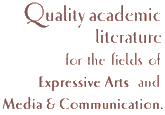
- Song the Only Victory
- Minstrels of Soul
Knill, Barba, Fuchs - Tending the Fire
Ellen Levine - Crossing Boundaries
Edited by Stephen K. Levine - To Day
Margo Fuchs-Knill
